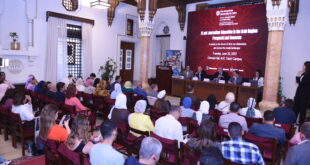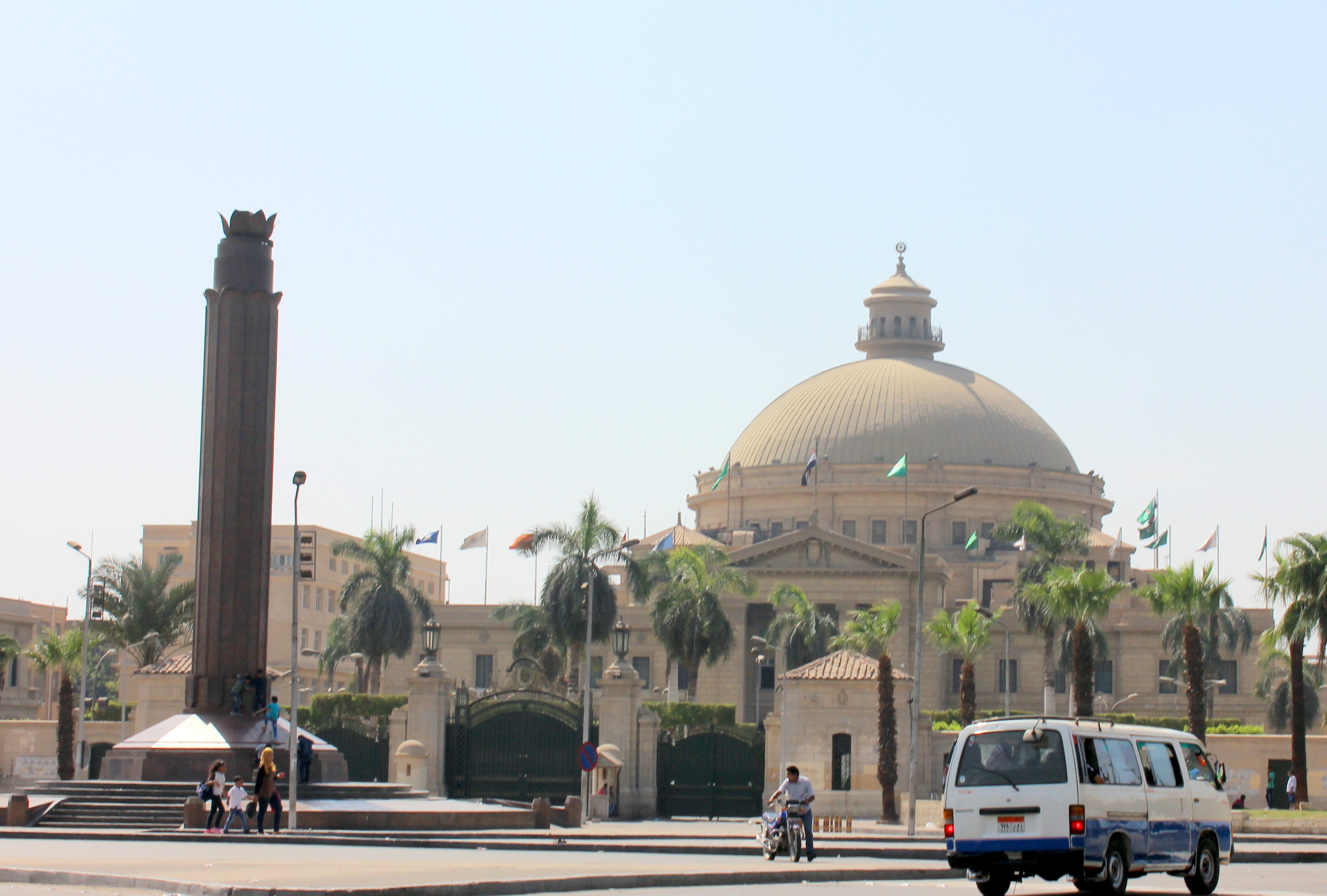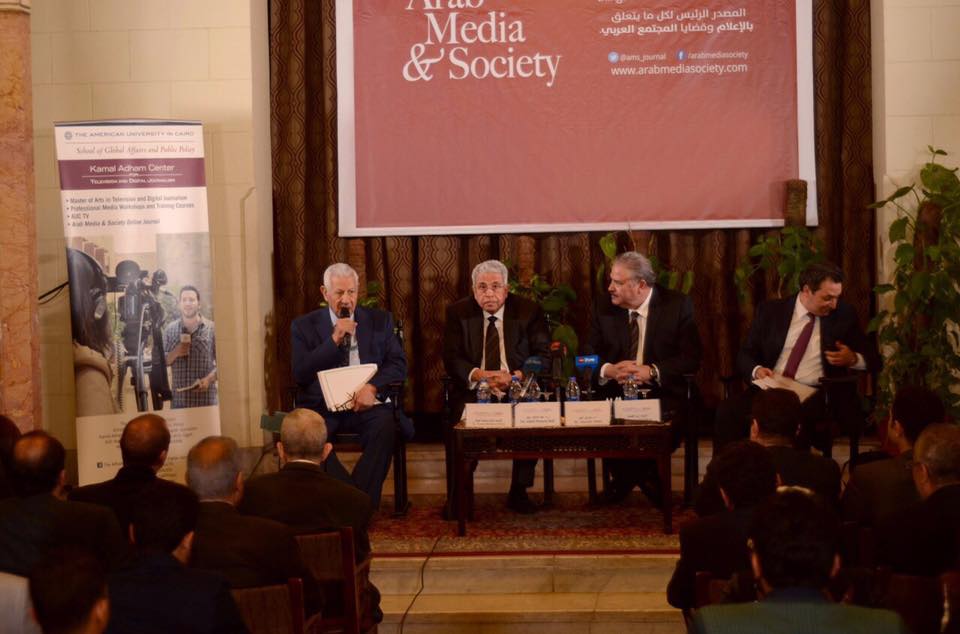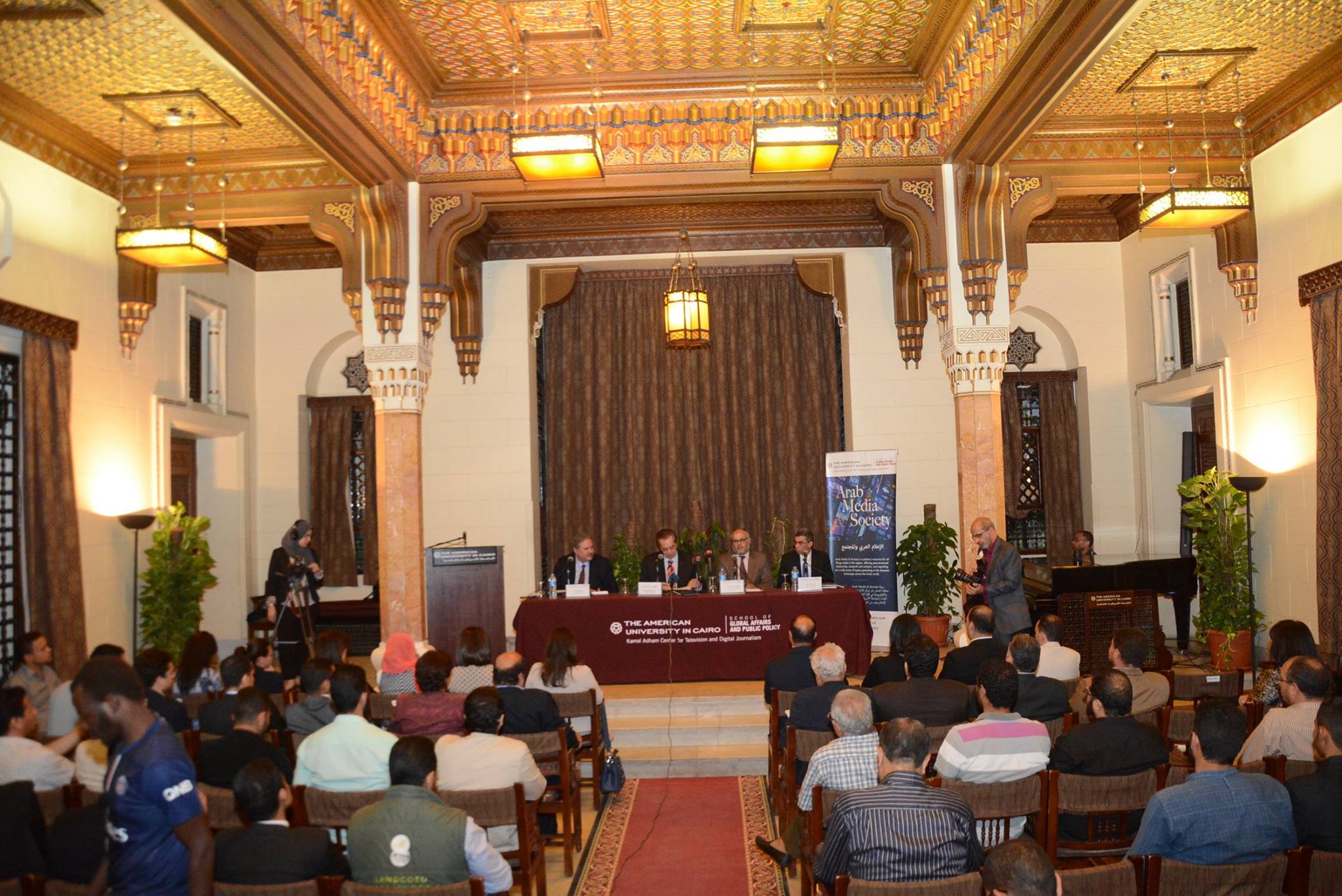Keynote speeches were made at the opening session of the Arab Media Summit in Dubai, October 7, 2003, by Sheikh Mohammed Bin Rashid Al Maktoum, crown prince of Dubai and minister of defense of the United Arab Emirates, by German Chancellor Gerhard Schroeder, by UAE information minister Sheikh Abdullah bin Zayed Al Nahyan, and by Chris Cramer, managing director of CNN International. TBS reproduces here the remarks of the last two.
Speech by His Highness Sheikh Abdullah bin Zayed Al Nahyan
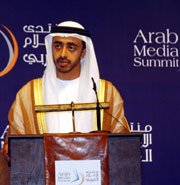
Ladies and Gentlemen,
I am pleased to be with you today, and to share with you my evaluation of the role of the Arab media in covering the recent conflict in Iraq.
First, though, let me pay tribute to those media personnel who died in that conflict.
Let me say, simply, that they died doing their duty, and they died honorably. It is easy - indeed sometimes convenient - for many outside the media to overlook the fact that the job often involves placing one's life on the line in order to record the news.
Your colleagues who died, as well as those who were wounded, displayed consummate professionalism, and many made the ultimate sacrifice. I extend my sincere condolences to their families, their colleagues and their organizations. I hope that they may enjoy the mercy of Almighty God. They are a credit to your profession.
In my remarks today, I shall concentrate NOT on what the Arab media has achieved in positive terms, and has been clearly felt by Arab audiences all over the world and which has already been commented on by the Western media. Indeed, they sometimes seemed jealous.
Instead, I shall focus my remarks on what the Arab media has NOT been able to achieve and on negative aspects, with the objective of suggesting ways in which mistakes can be corrected and loopholes closed in the future.
Being fully frank, we can state, simply, that before the war, the Arab media failed to expose the true nature of the Iraqi regime. We all know that it was based on terrorism and oppression, and that it had waged more than one war against its neighbors, and that it had occupied a neighboring country and had tried to erase that country from the political map.
Yet the Arab media forgot, or appeared to forget all that, and failed to explain it to its audiences. Over and above that, the Arab media dealt with the regime as if it were safe and sound, and went along with its efforts to portray the impending conflict only as a war between Western powers and an Arab regime that was ready to confront and to defy them in the name of Arab dignity and solidarity.
Let me ask this: why did the Arab media not pay some attention to the way in which the Iraqi Government dealt over the years from the early 1990s with its crisis in relations with the United Nations in terms of that body's resolutions? Did our media not ignore and overlook the sufferings of the Iraqi people, and the difficult conditions under which they lived?
By so doing, the Arab media distanced itself from reality, and, thereby, contributed to the misleading of public opinion by providing unrealistic impressions of the possible results of the looming conflict, even though the outcome of that conflict was inevitable.
Was there not the option of giving some objective Arab military analysts the opportunity of explaining that the existing balance of power made the defeat of the Iraqi armed forces inevitable?
Had our media taken up this option, then we would not have witnessed the state of depression and despair that arose in the area after the conflict.
Ladies and Gentlemen,
We are engaging in self-criticism. This means that we should talk frankly, even it that is sometimes painful.
Our Arab media, especially the satellite stations, found themselves once the crisis began to escalate to be in the grip of the Iraqi regime. This managed, in effect, to make them become mouthpieces for what the Iraqis said.
We recognize that it was not possible for the media representatives to work in or to stay in Iraq without the approval of the Iraqi Government, and we recognize also that this required those representatives to handle the situation carefully.
But was there no place for objectivity, or for a realistic approach, in their newsrooms, whereby a distinction could be made, one way or another, between reality and fiction, or between propaganda and presenting the other point of view?
Was it impossible for the Arab media to scrutinize what was being said and to discuss it in depth, so as to ensure that the audience was immunized against being misled by misinformation and fiction? Had this happened, then the audience would not have been swayed by impractical and unrealistic ideas.
We now see, of course, that matters are becoming even worse for the Arab media, with a similar situation now emerging as a result of the restrictions recently imposed on news reporting from Iraq. These have been the subjects of criticism both in the Arab media and internationally, because they may result in serious consequences for the freedom of the press, something we consider to be a basic principle that should be upheld at all times.
At the same time, however, we should acknowledge that there is a thin line - and one which is sometimes difficult to discern or to draw - between this freedom of the press to report and the need to have a media which is responsible, between the right to cover important events and the instigation of violence. We believe that the press should have the freedom to report on events, but it is also important that such reporting should not land the media in a situation where they are trapped into propagation of violence through an excessive concentration on such events irrespective of our assessment of their nature and effectiveness.
Iraq today has many, many issues that are worthy of attention from our Arab media. Our coverage should not be confined to incidents that occur from time to time.
We believe that the lack of objectivity and of a balanced approach, such as would involve the presentation of facts without coloring them with the personal evaluation of the media personnel concerned, was not, however, restricted simply to coverage of the Iraqi side of the recent conflict.
Thus the Arab journalists embedded with the coalition forces suffered from a lack of objectivity and balance because they were able to report only the information they were given, and because their movements were restricted. This deprived them from obtaining a full and balanced picture.
As one of the prominent Western reporters noted a few weeks ago, she, too, had to practice self-censorship, while her station had felt intimidated both by the US Administration and by competitors.
Arab journalists who were embedded were, though in an even worse position, because they were viewed by their hosts as lacking in the professionalism of western journalists, and this made their job even more difficult.
Still, though let me raise the question: Was there nobody in the newsrooms who was capable of obtaining a better balance of coverage that would enable them to present the news in a more balanced and objective context?
Presenting information - full information - that will enable an audience to distinguish between facts and opinions is one of the well-known basic requisites of media ethics. But let us look at what happened in the Arab media before the war began.
Arab Governments in general, and the Arab regional organization, ignored the facts and began, instead, to issue misleading statements that floated around in a way that bore no relation to reality. These statements found their way, of course, to the Arab media, and were published or broadcast without scrutiny, evaluation or criticism.
Where were the voices that should have reported on the basic ingredients of the situation: the imbalance of power, the nature of the Iraqi regime, the imminent danger of war and on its inevitable outcome?
There was a single voice that WAS raised, to warn against the anticipated and inevitable destruction of Iraq as a country, society and people, and which called on the Iraqi president to step down, through an Arab initiative to be coordinated with the Secretary General of the United Nations. Yet that lonely voice was suppressed by the Arab regional system, and the Arab media went along with that suppression, even as destruction was imminent.
We are not here today to discuss the way the Arab countries dealt with the war and its repercussions - that is THEIR job. They should learn the appropriate lessons.
It is our duty in the Arab media, however, to engage in self-criticism of our performance and to draw the right conclusions. Nothing should prevent us from doing that, so that we can advance to an Arab media that informs, but does not deceive, that explains, but does not distort.
We say this here, because we feel that our media is still, to a large extent, using the same old terminology to describe things, as if what happened was merely an event. In fact, what happened was a failure of a regime and of a state and of a series of concepts and ideas.
Following on from these remarks, and engaging in some further self-criticism, let me refer to what appears to be a trend that is increasingly noticeable on our Arab satellite channels. This is the delivery of programs of a type that I would entitle: "What the People Want to Hear." In such programs, the slogan seems to be: "To hell with objectivity, balance and quiet explanation of viewpoints."
No, Ladies and Gentlemen,
This is not the function of information.
We call upon Arab commentators, writers and program presenters to appraise their own work, and to correct their approach. Our Arab audience deserves no less - it deserves to know the facts, to be addressed with a rational and quiet manner, in a language that does not inflame the emotions, but enlightens the mind, and sheds light on difficulties and mistakes, thereby helping the audience to see how these can be addressed and corrected. And this has to be done without slipping into indoctrination.
Furthermore, I note that there is a tendency among some Arab analysts and commentators to generalize, rather than to be specific. At the same time, they try to put the blame for all of the catastrophes and mistakes of the Arab world on external factors.
We should acknowledge our mistakes, so that we can correct them. We should tell the truth to those who commit errors. We should not be lured on to the easy road of generalizing, taking one incident or point to say that a whole society or country is responsible for that single incident. We should accept that our Governments and societies have weak points, and that THEY are responsible for their failures, as well as their successes.
If we do that, then our media will really contribute to the creation of an enlightened and effective public opinion.
Only through such a qualitative leap can the Arab media satisfy the needs of our people for accurate information. And this can be achieved only by you.
Ladies and Gentlemen,
It is time for us to face up to the current situation, with all its mistakes and errors.
I am confident that there are among you, in this hall and outside it, women and men who are capable of shouldering this huge task.
Thank you.
Speech by Chris Cramer, managing director, CNN International
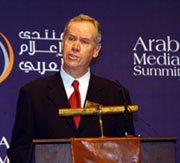
Salaam alay--koum.
Peace be upon you.
I can't think of a more appropriate greeting - given what's on in the world.
You know, I don't think our industry, the media industry, ever before had such a profound influence over the minds and emotions of the world as it does now.
When I was asked a few months ago to address you here today my first thoughts were that my good friends in the Arab media might consider it arrogant and presumptuous in the extreme.
What can a representative of CNN- and the western media - possibly have to say which would be relevant to you gathered here?
So some ground rules.
Am I here to lecture you?? No!!
Am I here to draw parallels between what we do at CNN and in the United States? Certainly not.
I'm here-and I'm very grateful for the opportunity-to speak to you as I hope a trusted peer in this dynamic and ever changing industry of ours.
It happens that at the moment I'm managing director of CNN International (so you can blame me for everything you watch that you think we get wrong !!!!!!)
And recently, I was trying to explain to my 88-year-old father in Britain what I did for a living. He has always been curious.
I told him proudly that I run all the correspondents and bureaus and channels around the world for CNN.
"So do you tell Christiane Amanpour what to do," he asked.
Have you noticed how our fathers always ask the question you don't want to be asked??
The answer is of course - no-one tells Christiane Amanpour what to do .
She is very much her own person. That's not to say we agree with everything she has to say, but we do admire her for standing up for her beliefs.
So - at the moment I am at CNN.
Before that I was with the BBC for 26 years, man and boy.
And before that in newspapers for a few years.
So, with your permission, I would like to talk to you not as a broadcast executive ------ but simply as a journalist. One who, like many of you, I suspect, has found himself in the eye of the storm from time to time.
I want to spend a few minutes talking less about our separate organizations and more about our mutual journalism.
Less about the bottom line and more on editorial integrity (not that profit is unimportant).
I'd like to talk about our people-our journalists, our staff. Those in the field reporting on the war in Iraq and it's aftermath, others who ensure that coverage makes it to home base and everyone else in between.
Let's also talk about how the events of the last year or two have dramatically changed the way we work. The way we prepare and the way we survive.
And most importantly, I want to talk not about the things which divide us but about the things which bring us together.
Understanding that we are all connected, we live in a connected world and therefore we all bear the same huge responsibility to our viewers and readers.
So let me start with editorial integrity.
What does it mean anyway? Different things to different people I reckon.
I believe that values and beliefs are at the very core of the brand of any news provider. That's what I was taught during those 26 years at the BBC.
And that's what we subscribe to at CNN. And what many of you practice every day as well.
The CNN brand promise is about journalistic credibility.
The strength of our reporting, the experience of the reporter, the skill of the cameraman or woman and that of the news editors who handle their output. Every bit of it adds to our credibility.
What we strive to do is to gain a position of trust with every viewer who comes to watch us.
And you know that trust doesn't come easily.
It needs to be earned, grown and then retained. And a reputation as a channel of record can only be achieved through the standards set by its journalism. Every day, every week-every month.
Who was it who said that your reputation arrives on foot - and leaves on horseback? In other words it is a very fragile thing. Very tenuous. Very precious. And from time to time even trusted world brands like CNN's need to pause and take stock of what it is. What it stands for.
I'd like to share with you what we did at CNN international in those long and frightening weeks and months before the US-led war against Iraq. As the chances of war seemed inevitable, I decided to speak to each and every one of our editors, writers, producers and technicians.
To the studio directors and graphic artists. To cameramen and of course correspondents. I reminded them of their responsibilities as employees of an organization that for 23 years has aspired to cover the world comprehensively, accurately and fairly.
An organization born of a crazy dream by our founder Ted Turner -I say crazy because he wanted to cover the world with a single TV news channel available to all.
And his dream is no less sound today as it was more than two decades ago.
So as war approached this past spring I told CNN staff this was going to be the single greatest crisis they had ever covered. I refused to use the word story.
What has played out in Iraq and in this region is not a story. It's a crisis. We shouldn't demean it.
I asked CNN staff to drill very deeply into what was happening in the region To be skeptical at all times-of politicians, lobby groups and military minds. Skeptical-but never cynical.
I reminded them, though they hardly needed reminding, that CNN is not a mouthpiece for any government-the US government, the British government or any other government for that matter. And I told them that the war was going to be bitterly controversial and unpopular in many places.
- I asked them to chart every piece of diplomacy, every piece of anti-war and pro-war debate and protest.
- To talk to people with unpopular viewpoints. Even unpalatable viewpoints.
That's why you saw as much coverage of the debate and dissent as was physically and financially possible for us to provide.
And why-when the war started, as we all feared it would-our anchors and presenters challenged and tested the assertions of politicians, military pundits, so called experts. And saw them challenge our own reporters and correspondents covering the conflict.
Including those 'embedded' with coalition forces-those 600 or so reporters, photographers and cameramen & women deployed with the US and British forces. And then in Baghdad.
The crisis in Iraq is, as we all know, very much still with us. It didn't end, as many predicted, after five or six weeks with the removal from power of Saddam Hussein and his immediate coterie.
It will dominate our reporting for some considerable time to come. And will set new challenges for us all in the way of resources and financial commitment and dangers for our staff.
It's a particular challenge for the new emerging Arab broadcast media - many of you represented here today.
And let me salute you for your courage and commitment in covering this conflict, the one in Afghanistan and the continuing nightmare in Israel and the Palestinian territories. I believe the new Arab media have brought a collective voice which is crucial for the people of this region and for those of us outside the area as well.
One more torch to shine on the area. Another form of illumination for the millions of Arabic-speaking viewers around the world.
To be welcomed by all those among us who believe in a free flow of information. The important news events in this region demand better coverage-and in a small way we too at CNN have reacted to this need.
It's why we launched our Arabic website back in 2002 right here in Dubai-a modest operation, staffed by dedicated people, but already very successful; 40 percent of the people accessing CNNarabic.com live in North America.
Also why we launched a new program on CNN just last week devoted just to the region-Inside the Middle East"; this program, hosted by Rula Amin, will focus on the economic, social and cultural affairs of the middle east - go beyond the usual headlines and showcase the regions' rich cultural heritage and of course the technological developments taking place daily throughout this often misunderstood region. Uplifting stories, stories full of hope.
And I'm delighted to be able to confirm that in a couple of weeks time (October 23-26) you will be able to watch on CNN Tom Friedman 's quite remarkable new documentary Searching for the roots of 9/11, which is a remarkable journey into the lives, beliefs and concerns of Muslim 's and how they perceive America.
It's the type of landmark documentary that I'm proud to have on CNN.
Part of our job is to offer a much broader and more comprehensive coverage of the events here.
All of this should remind us how precious the flow of accurate information is these days. The responsibilities that all journalists-news broadcasters in particular-have to people around the world is truly awesome. It's been said that these days the stakes have never been higher. There are those who believe that the information world changed dramatically after the tragic events of September 11th in the United States two years ago last month. Either way, there certainly is a new hunger for international news. A need to understand the wider world. A realization that the world is connected-we are all connected-and that the events in one country can have an immediate and dramatic effect on all of us. Add to September 11th the war in Afghanistan, new upheavals in the Middle East, dark days in West Africa and, of course, the war in Iraq. These never ending crises mean that those of us in the news media are constantly being put to the test. Never has there been a greater need for trusted impartial news sources. The independence, integrity and diversity of news channels are at a premium. All of us have a duty, as journalists and to our respective news organizations, to retain and build upon the trust that we have earned from audiences and readers.
Many of them rely solely on us for news and timely information and we have a responsibility to deliver this as accurately and as speedily as possible. (In that order-speed follows accuracy. Never the other way around. First with the news and wrong with the news does nothing for our brand integrity.)
I mentioned just a moment ago that we live today in a very connected society. Information for much -not all, but much of the world is freely available. We live in the true global village. Every action can have a reaction. Something here in Dubai can reverberate in New York, Paris, Hong Kong, Tehran. In a matter of seconds and minutes. Like the spread of SARS earlier this year, spreading fast and loose as it landed in places around the world. However, unlike SARS journalism can't be quarantined.
We're all connected in some way. We may broadcast or write to a different audience or in a different language in 'different ways'. But in the end we bear the same responsibilities.
Allow me end on this very personal reflection.
Like many of you here today I am a parent keen to raise my own family in a safe and peaceful world.
Which is why I take this job as a leader of the world's first 24-hours news channel very seriously.
I think it's absolutely imperative that we make every effort to place objectivity, truth and integrity before ratings, circulation, advertising dollars and sensational story telling.
Contrary to what the public may think, we in the news business can't control the turn of world events, but we can report the truth behind the stories as they unfold. If by doing that those in positions of power try and make our world a more tolerant and peaceful place for all of our children to live in, then we will have done our job. And we can be proud-very proud indeed.
Thank you for listening.
 Arab Media & Society The Arab Media Hub
Arab Media & Society The Arab Media Hub
